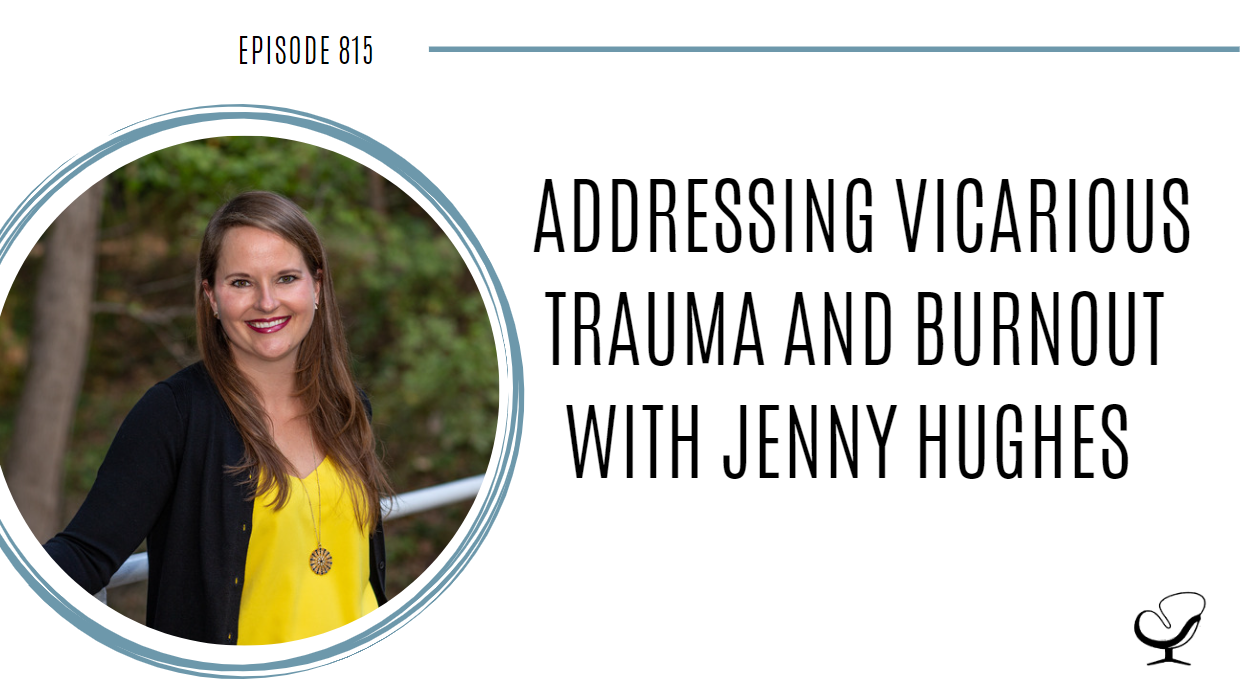Podcast: Play in new window | Download | Embed
Are you struggling to stop thinking about a certain client? Have you heard of vicarious trauma? What should you do if you suspect that either you or your colleague is struggling with vicarious trauma?
In this podcast episode, Joe Sanok speaks about addressing vicarious trauma and burnout with Jenny Hughes.
Podcast Sponsor: Apply!
Whether you’re starting a solo practice, thriving in solo practice, getting a group going, or thriving in a group! Or launching a big idea, or thriving with your big idea, we have a consultant that can help you.
With our team, we continue to grow to have consultants that will help you at every single phase of practice.
If you want to apply to have a 30-minute pre-consulting call with me, I would love to chat through where you’re at.
The goal is to just hear where you at, where you’re headed, and where you want to change things, and then to say, “Here’s where I’d spend my time and money if I were in your situation!”
We have enough people applying at every phase of practice, so we don’t need to squeeze you into anything. In fact, we would hate that.
We would rather say, “Here’s where we can join you and offer some consulting to help you reach your goals faster”.
So, apply over at practiceofthepractice.com/apply if you want some help with one-on-one consulting today.
Meet Jenny Hughes

Jenny Hughes is a licensed clinical psychologist specializing in the treatment of trauma and PTSD. As a clinician, she practices EMDR, Cognitive Processing Therapy, and Prolonged Exposure therapy.
While her work is incredibly rewarding, Jenny knew the therapists making space for this healing deserved to be cared for too. This inspired her to create The BRAVE Trauma Therapist Collective, a membership site that helps trauma therapists go from feeling drained and demoralized to energized and empowered.
Visit Jenny Hughes’ website, BRAVE, and connect on Facebook, Instagram, and TikTok.
FREEBIE: Check out this Vicarious Trauma Tracker for trauma therapists
In This Podcast
- What is vicarious trauma?
- Common signs of vicarious trauma
- What to do when you notice vicarious trauma in yourself or others
- Jenny’s advice to private practitioners
What is vicarious trauma?
When I talk about vicarious trauma, I talk about it as something unique to helpers and healers … for me, vicarious trauma happens when we can’t stop thinking about the clients that are really heavy on our hearts.
Jenny Hughes
Vicarious trauma is often mostly experienced by caregivers who become beyond invested in their clients, and are impacted by the sessions outside of the therapy room.
That can then turn into avoiding things at work, whether it be voicemails or emails [or] trying to avoid certain kinds of clients or even individual people that we work with because we don’t feel like we have the capacity and the resources to manage that stress and trauma that we are inevitably soaking up because we’re empathic people.
Jenny Hughes
Vicarious trauma is not a disorder but an occupational hazard because it can happen to empathetic people, and therapists create those empathic spaces for their clients.
This is a regular occurrence and it doesn’t mean that you’re a bad therapist, it doesn’t mean that you’re not cut out for this work, it means that you’re a human being.
Jenny Hughes
Common signs of vicarious trauma
- Irritability and common symptoms of depression
- Constantly thinking about a specific client
- Having nightmares involving a specific client
- A loss of joy or purpose in the work you do
What to do when you notice vicarious trauma in yourself or others
1 – Name it to address it
Just like we do with our clients, giving a name to that experience can actually feel really freeing [because] it gives us an explanation of what is going on.
Jenny Hughes
2 – Reach out to trusted colleagues
3 – Practice realistic and sustainable self-care
Jenny’s advice to private practitioners
You deserve to be cared for too. Don’t hesitate to ask for help, because you deserve it, and it is there for you.
Sponsors mentioned in this episode:
- Apply over at practiceofthepractice.com/apply if you want some help with one-on-one consulting today.
- Use promo code ‘JOE’ to get three free months to try out TherapyNotes, no strings attached, and remember, telehealth is included with every subscription free.
Books mentioned in this episode:

Useful Links mentioned in this episode:
- Visit Jenny Hughes’ website, BRAVE, and connect on Facebook, Instagram, and TikTok.
Check out these additional resources:
- The Nervous System, Somatic Work, and Finding Your Balance Again with Victoria Albina | POP 814
- Apply to work together
- Events – click on the event’s dropdown
- Sign up to join the free webinars and events here
- Podcast Launch School
- Practice of the Practice Podcast Network
- Free resources to help you start, grow, and scale
- Apply to work with us — a decision-making matrix for your next steps
Meet Joe Sanok
Joe Sanok helps counselors to create thriving practices that are the envy of other counselors. He has helped counselors to grow their businesses by 50-500% and is proud of all the private practice owners that are growing their income, influence, and impact on the world. Click here to explore consulting with Joe.
Thanks For Listening!
Feel free to leave a comment below or share this podcast on social media by clicking on one of the social media links below! Alternatively, leave a review on iTunes and subscribe!



